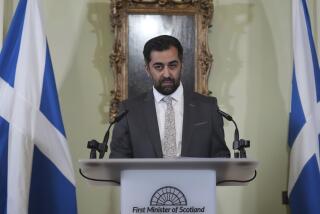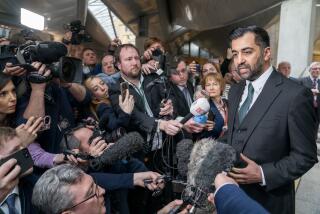As They Elect a Legislature, Scots Wrestle With Identity
- Share via
EDINBURGH, Scotland — When is a country a country?
Scotland has its own legal and educational systems, its own national museums and soccer leagues. It has a border with England--unchanged for centuries--and today, Scotland will elect its first parliament in nearly 300 years.
The Scots even call their land a country, but it is not an independent state. While the new Scottish legislature will have the power to make laws and levy some taxes, Scotland will remain an integral part of Britain, as will Wales, which today elects a local assembly with more limited authority.
Candidates running for the Scottish parliament kept to bread-and-butter issues during the campaign, avoiding the prickly question of independence. But it was never far from voters’ minds.
Perhaps inevitably, the election of a Scottish legislature has prompted debate about Scottish identity and the definition of Scottish nationalism. Rather than extinguish talk of independence, it has provoked soul-searching as to whether a Scottish parliament will satisfy a 3-centuries-old hunger for self-government, or whet an appetite for more.
“I think it all depends on what happens in the parliament,” said best-selling Edinburgh crime writer Ian Rankin. “If it’s good and we get confidence in ourselves as a nation, there will be less pressure to become independent. If a Labor-run parliament becomes a talking shop that does not give us what we want, there will be more pressure for independence.”
Rankin is already writing a whodunit around the murder of a member of the new Scottish parliament. Part of an ongoing Scottish cultural renaissance, he nonetheless struggles to define Scottish identity.
“I don’t know what it means to be Scottish. For so long, we defined ourselves as what we were not. We were not English. That was enough,” Rankin said.
Clearly, that is no longer the case. Rankin took another stab.
“Scottishness is a question of temperament and a love of the country. It is black humor and . . . to be glorious in defeat. For a Scot, there is no glory in small victories, only from big defeats. We celebrate the great battles we lost.
“Maybe,” he said, “it makes us feel we’ll do better next time.”
Many Scots say that a new legislature will give Scotland the self-confidence it has been lacking as a junior member of the United Kingdom since the last Scottish parliament signed away hundreds of years of independence in the 1707 Act of Union. It will bring out the industriousness and inventiveness that have characterized the many Scots who sought their fortunes abroad.
Accustomed to blaming England for their economic and social woes, Scots say they want to be good neighbors instead of surly lodgers. They want to take responsibility for their own affairs.
The need for self-government was driven home to a majority of the 5 million Scots during two decades of Tory rule, when Scotland voted overwhelmingly for Labor but was governed by Conservative administrations it could not stand.
Labor Prime Minister Tony Blair was elected in May 1997, and four months later called a referendum on the creation of a Scottish parliament. It was approved by a margin of 3 to 1. Labor is convinced that a parliament will satisfy Scotland’s nationalism in the same way self-government has prevented the succession of Catalonia from Spain.
It is probably not entirely a coincidence that a Catalonian architect, Enric Miralles, was selected to design the Scottish parliament building, which will be ready in 2001. Meanwhile, the 129-member parliament will meet in a Church of Scotland assembly hall converted into a horseshoe-shaped debating chamber--the antithesis of Westminster’s confrontational setup with Tory benches nose-to-nose with Labor’s.
Labor is expected to win the largest number of seats, although it may have to make an alliance with the Liberal Democrats to form a government with Labor’s Donald Dewar as first minister. The pro-independence Scottish Nationalist Party will probably run a strong second, positioning it to be a powerful opposition party.
Political analysts are interpreting opinion poll results and the anticipated vote as a reflection of pragmatism on the part of Scots. First of all, the electorate is banking on Labor’s experience in government over the SNP, whose leader, Alex Salmond, is regarded as a one-man band.
Secondly, although he did not campaign on the issue of independence, Salmond made it clear that, if his party wins a majority in parliament, he will see that as a mandate to call an illegal referendum on independence. Cautious Scots are not ready for that.
“Most would vote against a leap into the unknown,” Rankin said.
Nationalism is a frightening topic to many Europeans who have followed politics in Northern Ireland and the Balkans. While Scottish nationalists say their brand of nationalism is expressed at the ballot box, some Scots say there is always a potential for violence.
Scots may have been united against the English, but some wonder if they would fall back on regional and tribal differences--Glasgow versus Edinburgh, Highlands versus Lowlands, Protestant versus Roman Catholic--when left to their own devices.
They point to bloody street fights last weekend between fans of the Rangers and Celtic soccer teams after the Rangers--a Protestant team--won a league championship game on the Celtics’ Catholic turf. Dozens of people were stabbed and hundreds were arrested.
“Most people are cautious about independence,” said Lindsay Paterson, a sociologist at Edinburgh University. “If it is going to happen, it will take a while, just like it took a while to opt for devolution.”
In the meantime, he said, two things have happened. The once-marginal SNP has become a mainstream political party, and “independence is now a serious policy option in a way that it wasn’t before. Even if you reject independence, it is taken seriously.”
Many Scots want to remain part of Britain for political and economic reasons. They argue that it is not logical to create an independent state when power is moving from European capitals to the capital of the European Union in Brussels and it is not cost-effective.
Others make a reverse argument: If Britain adopted the European currency, the euro, and a European defense policy, decisions on these issues would move to Brussels as well, making the British parliament at Westminster increasingly irrelevant. Scotland would want to eliminate the middleman.
Irvine Welsh, author of “Trainspotting,” a novel about Edinburgh’s underbelly, said Scotland is in “a hybrid situation with national institutions and a national identity, but still no nation state.” A Scottish parliament is a steppingstone “on the inexorable path toward independence,” he said.
Business leaders and newspaper editors who once opposed the idea of a Scottish parliament have come around, and eventually they will sign on to independence, he said. “The opinion-formers are being dragged along with what the majority wanted.”
The English may force the issue before Scots do, Welsh suggested. Some English commentators and members of parliament already are complaining of unfairness, because Scots will help make laws that govern England in the Westminster parliament, but the English will have no say in Scottish law-making.
Welsh, who commutes between London and Edinburgh, does not hesitate when asked his nationality: “I am Scottish. Nobody’s British. It’s a lot of nonsense. Delusions. Either you’re Irish, English, Scottish or Welsh. You may live together in a state called Britain,” he said, “but it’s an imperialist thing. There’s no social substance to it.”
He articulates the feelings of a younger generation of Scots who identify with Britain less than the generations that fought in World War II or grew up in its wake. They feel proud of their Scottishness, but their cautious Scottish nature tells them not to brag.
“There are plenty of things to be proud about in Scotland; the sheer geographical beauty and all of that,” said Nicholas Forsyth, a 30-year-old taxi driver. “But perhaps it’s not wise to be blindly proud.”
More to Read
Sign up for Essential California
The most important California stories and recommendations in your inbox every morning.
You may occasionally receive promotional content from the Los Angeles Times.










